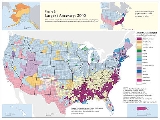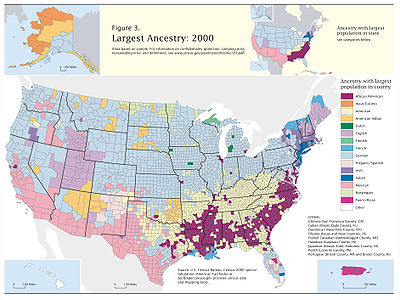
Yooper dialect
Encyclopedia
Yooper is a form of North Central American English
mostly spoken in the Upper Peninsula of Michigan
, which gives the dialect its name (from "U.P." for Upper Peninsula). The dialect is also found in many northern areas of the Lower Peninsula of Michigan
and largely in Northeast Wisconsin
.
Yooper differs from standard English primarily because of the linguistic background of settlers to the area. The majority of people living in the Upper Peninsula are of either Finnish, French Canadian, Flemish, Scandinavian, or German descent. Yooper is so massively influenced by these areas' languages that speakers from other areas may have difficulty understanding it. The Yooper dialect is also influenced by the Finnish language
making it similar in character to the so-called "Rayncher speek" of the Mesabi Iron Range in northeast Minnesota
.

Although these features are found in the UP, they are primarily in the western UP, and not all residents use these features. Equally important is the fact that many of these features are found throughout the upper midwest, especially in northern Wisconsin
and northern Minnesota
.
North Central American English
North–Central American English is used to refer to a dialect of American English. The region is also known as Upper Midwest among some linguists. It is also sometimes called the Minnesota Accent or Great Lakes Accent. It is widely spoken in the Upper Midwest and the northern portion of the...
mostly spoken in the Upper Peninsula of Michigan
Upper Peninsula of Michigan
The Upper Peninsula of Michigan is the northern of the two major land masses that make up the U.S. state of Michigan. It is commonly referred to as the Upper Peninsula, the U.P., or Upper Michigan. It is also known as the land "above the Bridge" linking the two peninsulas. The peninsula is bounded...
, which gives the dialect its name (from "U.P." for Upper Peninsula). The dialect is also found in many northern areas of the Lower Peninsula of Michigan
Lower Peninsula of Michigan
The Lower Peninsula of Michigan is the southern of the two major landmasses of the U.S. state of Michigan. It is surrounded by water on all sides except its southern border, which it shares with Ohio and Indiana. Geographically, the Lower Peninsula has a recognizable shape that many people...
and largely in Northeast Wisconsin
Wisconsin
Wisconsin is a U.S. state located in the north-central United States and is part of the Midwest. It is bordered by Minnesota to the west, Iowa to the southwest, Illinois to the south, Lake Michigan to the east, Michigan to the northeast, and Lake Superior to the north. Wisconsin's capital is...
.
Yooper differs from standard English primarily because of the linguistic background of settlers to the area. The majority of people living in the Upper Peninsula are of either Finnish, French Canadian, Flemish, Scandinavian, or German descent. Yooper is so massively influenced by these areas' languages that speakers from other areas may have difficulty understanding it. The Yooper dialect is also influenced by the Finnish language
Finnish language
Finnish is the language spoken by the majority of the population in Finland Primarily for use by restaurant menus and by ethnic Finns outside Finland. It is one of the two official languages of Finland and an official minority language in Sweden. In Sweden, both standard Finnish and Meänkieli, a...
making it similar in character to the so-called "Rayncher speek" of the Mesabi Iron Range in northeast Minnesota
Minnesota
Minnesota is a U.S. state located in the Midwestern United States. The twelfth largest state of the U.S., it is the twenty-first most populous, with 5.3 million residents. Minnesota was carved out of the eastern half of the Minnesota Territory and admitted to the Union as the thirty-second state...
.
Some common features of English in the UP
lang=en
- Canadian raisingCanadian raisingCanadian raising is a phonetic phenomenon that occurs in varieties of the English language, especially Canadian English, in which certain diphthongs are "raised" before voiceless consonants...
- Use of German/Scandinavian "ja" as "yeah" or "yes," spelled "ya."
- Tendency towards intonation that stresses the first syllable of each word, which is an influence of Finnish spoken by many immigrants in the late 19th and early 20th centuries. sometimes becomes /v/, for example, /ˈkiːvənɔː/ for KeweenawKeweenaw PeninsulaThe Keweenaw Peninsula is the northern-most part of Michigan's Upper Peninsula. It projects into Lake Superior and was the site of the first copper boom in the United States. As of the 2000 census, its population was roughly 43,200...
. This is an example of language transfer, where immigrant languages have affected the variety of English spoken in the area. This feature is especially found among residents born before 1950 and in the western region of the UP. - Ending of sentences in "EhEhEh is a spoken interjection in English, Armenian, Japanese, French, Italian, Greek, Spanish, Portuguese and Catalan that is similar in meaning to "Excuse me," "Please repeat that" or "huh?" It is also commonly used as a method for inciting an answer, as in "It's nice here, eh?" It is occasionally...
." Used at end of sentences with the expectation of receiving an affirmative response or as another word for "huh." ("So, you're /jɛr/ goin' out t'nide, eh?"), or to add emphasis to a statement, "That's a pretty dress, eh." "Eh" is often associated with Canadian EnglishCanadian EnglishCanadian English is the variety of English spoken in Canada. English is the first language, or "mother tongue", of approximately 24 million Canadians , and more than 28 million are fluent in the language...
. "Heh" is used interchangeably and perhaps more often among younger speakers. - Replacement of dental fricatives, /ð/ and /θ/, like in "this" and "thigh," with alveolar stops /d/ and /t/, so then (/ðɛn/) becomes den (/dɛn/) and thigh (/θaɪ/) often becomes tie (/tʰaɪ/), etc.
- Deletion of "to the", e.g., "I'm going store," "We went mall," and "We go Green BayGreen Bay, WisconsinGreen Bay is a city in and the county seat of Brown County in the U.S. state of Wisconsin, located at the head of Green Bay, a sub-basin of Lake Michigan, at the mouth of the Fox River. It has an elevation of above sea level and is located north of Milwaukee. As of the 2010 United States Census,...
." This is an influence from Finnish, which doesn't have the articles "a," "an," or "the", and the preposition "to" is replaced by the illativeIllative caseIllative is, in the Finnish language, Estonian language and the Hungarian language, the third of the locative cases with the basic meaning of "into ". An example from Hungarian is "a házba"...
and allative caseAllative caseAllative case is a type of the locative cases used in several languages. The term allative is generally used for the lative case in the majority of languages which do not make finer distinctions.-Finnish language:In the Finnish language, the allative is the fifth of the locative cases, with the...
s, which, being absent from English, are simply deleted (cf. Finnish Menemme Green Bayhin). - Words such as "pank" (to make compact, pat down), "chuke" or "chook" (a knit winter cap, from Canadian French "tuqueTuqueA – variously known as a knit hat or stocking cap among other names – is a knitted cap, originally of wool though now often of synthetic fibers, that is designed to provide warmth in winter...
" [tsʏk]), "choppers" (long-sleeved mittens, sometimes with removable finger flaps, often made of deerskin), "swampers" (boots with rubber bottoms and leather uppers), "pastyPastyA pasty , sometimes known as a pastie or British pasty in the United States, is a filled pastry case, associated in particular with Cornwall in Great Britain. It is made by placing the uncooked filling on a flat pastry circle, and folding it to wrap the filling, crimping the edge at the side or top...
", "bakery" (baked goods), "make wood" (cut or chop wood), "snow scoop" or "yooper scooper" (a metal implement for "moving snow"), "wa" (instead of wow) and pronunciations such as "grodge" (garage), "crick" (creek), "ruts" (roots) - Replacing the "-ing" at the end of certain words with "-een" (doing becomes "do-een", happening becomes "happen-een", something becomes "some-theen")
- Deletion of the object of the preposition. Example: Instead of saying "Would you like to come with us?" A Yooper might say "Would you like to come with?" This may be an influence from German, which has similar structures available in its grammar.
Although these features are found in the UP, they are primarily in the western UP, and not all residents use these features. Equally important is the fact that many of these features are found throughout the upper midwest, especially in northern Wisconsin
Wisconsin
Wisconsin is a U.S. state located in the north-central United States and is part of the Midwest. It is bordered by Minnesota to the west, Iowa to the southwest, Illinois to the south, Lake Michigan to the east, Michigan to the northeast, and Lake Superior to the north. Wisconsin's capital is...
and northern Minnesota
Minnesota
Minnesota is a U.S. state located in the Midwestern United States. The twelfth largest state of the U.S., it is the twenty-first most populous, with 5.3 million residents. Minnesota was carved out of the eastern half of the Minnesota Territory and admitted to the Union as the thirty-second state...
.

